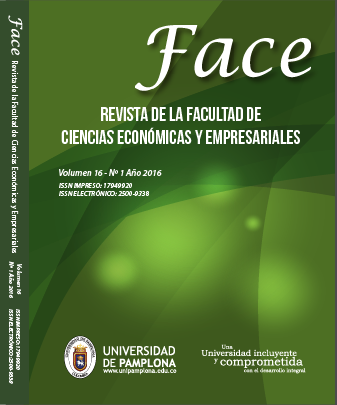ANALYSIS OF KEY FACTORS FOR COMPETITIVENESS IN THE SOFTWARE INDUSTRY: PERSPECTIVE OF THE BUSINESSMAN IN COLOMBIA*
DOI:
https://doi.org/10.24054/face.v16i1.1248Palabras clave:
Colombia, competitiveness, software industryResumen
This paper presents an analysis of the key factors that, seen from the point of view of entrepreneurs in the software development
industry in Colombia, may have a positive effect on the competitiveness of this sector. The starting point of this research is based
on improvement opportunities for these companies, taking into account the attractive aspect of this industry due to its high degree
of innovation and value-added products.
The research was developed with a mixed approach, with an exploratory and a descriptive scope; performing an interpretative
work on bibliographic sources and subsequently designing an instrument for acquiring data related to factors that influence the
competitiveness of the sector. From these results, a correlation analysis of variables, useful for purposes of sectoral intervention
was performed.
As a result, there is a correlation between competitiveness and the variables associated with government support, quality of
education, existing certifications and processes of economic openness. These results are expected to be useful in promoting
programs, plans, and sectoral projects for continuous improvement of the companies that are part of the analyzed sector.
Descargas
Referencias
Arora, A. a. (2005). From Underdogs to Tigers: The Rise
and Growth. NY, USA: Oxford University Press.
Avalos, I. (2003). Technology Transfer. Caracas: Nueva
Sociedad.
Business Software Alliance (2011). IT Industry
Competitiveness Index. Prepared by BSA
Worldwide Headquarters, Washington, DC.
Castellanos, M. (2007). Industrial technology foresight
study for the software industry and related
services. Technical report, National University of
Colombia. Bogotá D.C., Colombia.
CEPAL. (2009). Challenges and opportunities of the
software industry in Latin America. Colombia:
CEPAL and Mayol Ediciones S.A.
DANE. (2008). Measuring ICT in Colombia. Bogotá D.C.,
Colombia.
Datanalisis. (2005). Study of the software industry in
Colombia 2005. Bogotá D.C., Colombia:
Unpublished.
FEDESOFT. (2006). Importance of the software industry
worldwide. Bogotá, D.C, Colombia.
FEDESOFT. (2009). The IT sector in colombia. Technical
report. Bogotá D.C., Colombia.
Consultative, Scientific and Technological Forum (2009).
Measuring the progress of societies: reflections
from Mexico, pp 199-203. Prepared by the
scientific and technological advisory forum, A.C.,
México Distrito Federal.
World Economic Forum. (15 March, 2013). Annual
competitiveness report 2012 - 2013. Retrieven on
July, 2013, from:
http://reports.weforum.org/globalcompetitiveness-report-2012-2013/#=
Santoro, M., Bierly, P., Gopalakrishnan, S. (2007).
Organizational Learning from External Sources:
New Issues and implications. International
Journal of Technology Management, 38 (1/2), p.
-19.
López, F. (2006). Competitiveness in Colombia: Economic
openness, support institutions and democratic
security. EAFIT University Magazine . 42 (142),
-25.
Ministry of Science and Technology of Brazil. (2004).
Innovation Law 10973. Sao Pablo, Brasil.
Mon Alicia, e. a. (2009). Improvement in processes for
software SMEs. Buenos Aires, Argentina.:
Buenos Aires University.
Noriega, M. S. (2006). Technological transfer: ¿what can
we learn from international experience? Journal
of Technological Management & Innovation, 1
(3), 1-3.
Economic and commercial office of the Spanish Embassy
in Bogotá. (2005). The software market in
Colombia. Bogotá D.C., Colombia.
Economic and commercial office of the Spanish Embassy
in Bogotá. (2006). Sectoral notes: the software
market in Colombia. Bogotá D.C., Colombia.
Perez, A. L. (2011). Growth of companies with late-entry
into the standardized software market: an
approach from the multigenerational competitive
difussion modelling, with network effects.
Doctoral thesis, National University of Medellín,
Mines Faculty, Computer Systems School,
Systems and Informatics Engineering. Medellín,
Colombia.
PWC. (2010). Global 100 Software Leaders. NY, USA.
Stefanuto, G. (2007). A Indústria de Software no Brasil:
fortalecendo a Economia do Conhecimento.
Secretaria de Ciência e Tecnologia doEstado do
Paraná (FINEP). (4), 37-48.
The European Software Institute - ESI. (2009). Software
Industry in Colombia - Technical report, European
Software. Madrid. Spain: Institute- Tecnalia.
Vaccarezza, L. (2011). Science, Technology and Society:
the state of affairs in Latin America. Madrid:
McGraw Hill.
World Economic Forum. (2013). Global Competitiveness
Report 2013–2014. The Global Competitiveness
Index 2013–2014: Innovation and sophistication
factors. NY, USA.
Yutronic, J. (2010). Science, technology and innovation in
Chile into the 21st century. Subjects in Latin
America. Globalization, Science and Technology,
(3), 115 - 142.
Descargas
Publicado
Versiones
- 2016-06-30 (2)
- 2022-03-14 (1)





